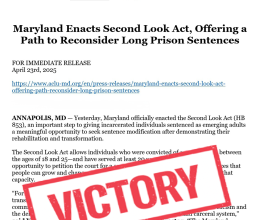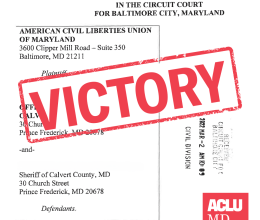
ANNAPOLIS, MD -- Today, leaders with the Maryland Coalition for Justice and Police Accountability are sounding the alarm about serious concerns with the proposed regulations by the Maryland Police Training and Standards Commission (MPTSC) on Police Accountability Boards (PAB) and Administrative Charging Committees (ACC). In response to an MPIA request, the coalition received a draft of regulations written by the MPTSC. The coalition has a number of objections it recently raised in a letter, and asked that they be considered before finalizing the regulations and beginning the notice and comment period.
"There is no accountability, no fairness, and no trust in a process that excludes the very people who need to be a part of the Police Accountability Boards,” said Joshua Hatch of Freedom Fighters LLC. "The PAB bill, as drafted in Anne Arundel County, will prevent anyone who has ever made a mistake in their life be part of the process. While police officers can continue to do their jobs with active investigations and complaints filed against them, folks with priors are held to a different standard."
Maryland Coalition for Justice and Police Accountability's objections:
- We object to the Commission setting eligibility and membership requirements for Police Accountability Boards. The Maryland Police Accountability Act (MPAA), gives the “local governing body” of each county the power to “establish the membership of a police accountability board.” This decision by the General Assembly recognizes the importance of allowing local communities, through their elected officials, to determine their own membership criteria and requirements.
- We object to the eligibility and membership criteria required for the ACC as they too usurp the power to establish the membership of an ACC that is expressly delegated by the MPAA to the “governing body” of each local jurisdiction. Just as local communities should be entitled to determine who oversees and recommends policies regarding its police disciplinary system, so too should local communities determine those members of their community who are entitled to pass judgment in individual cases of police misconduct.
- We particularly object to the limitations based on criminal history and immigration status. There is no reason why a person with an immigration status short of a legal permanent resident is not qualified to decide on police discipline. Nor should involvement in the criminal legal system render a person ineligible for service. Moreover, people WITH criminal legal system involvement must be included in this new disciplinary system; a civilian system that represents the full diversity of a community must include those civilians who have been directly impacted by policing.
- We object to the broad confidentiality requirements imposed on members of both boards; they are unnecessary and go well beyond the scope of the enabling legislation. The statutory provisions creating the PABs contain no confidentiality requirement at all, and members of other public boards and commissions are not typically required to sign confidentiality agreements.
- We object to requiring members to self-report criminal legal system involvement. Each county has its own definitions of “conflicts of interest” and processes for dealing with such conflicts; those are sufficient to govern any possible issues that may arise with an individual member.
- We object to the Maryland Police Training and Standards Commission’s insistence that they retain the authority to remove a member at any time, with no process at all, and to require immediate termination for failing to maintain the confidentiality of “all ACC matters” interferes with the authority of the governing body to establish the ACC’s membership.
- We object to the Maryland Police Training and Standards Commission seeking to block additional administrative disciplinary proceedings when new evidence arises showing that an officer’s conduct was more serious than was originally understood or that the officer violated policies other than those already addressed by an Internal Affairs Division, or even the ACC itself.
- We call on the Maryland Police Training and Standards Commission to impose internal deadlines to ensure that the information is transmitted in time for the boards to do their required tasks.
Learn more about the Maryland Coalition for Justice and Police Accountability.
###






